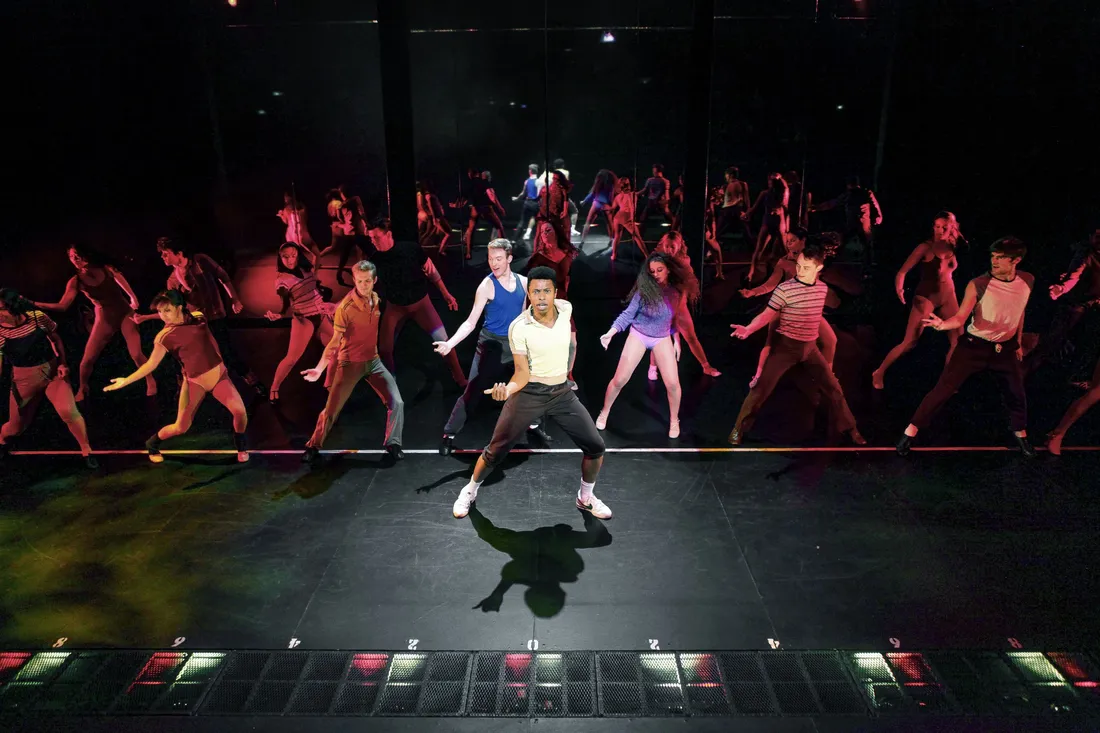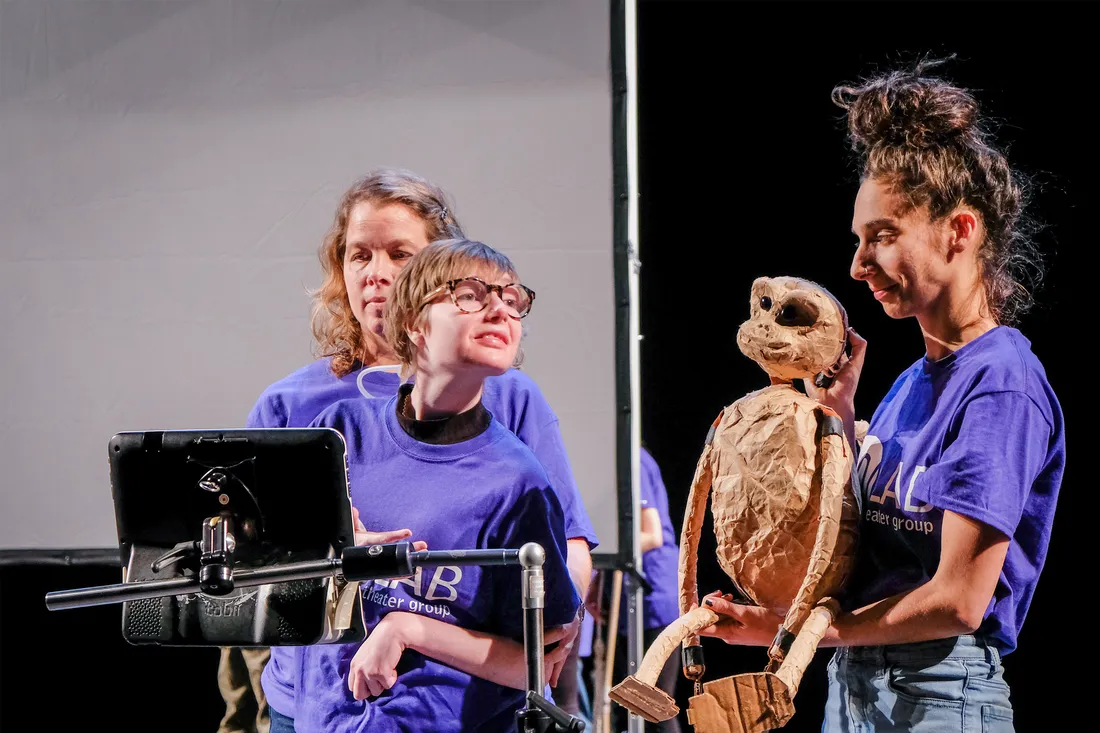
CO/LAB co-founder and teaching artist Arielle Lever ’10 (right) in a recent performance of CO/LAB’s Show of Shows. (Photo by Liz Furze)
Danielle Coles always wanted to act. But as someone living with cerebral palsy, she was constantly told no.
That changed more than a decade ago, when Coles’ day program enabled her to participate in a workshop by CO/LAB Theater Group. She was hooked. Coles’ desire to make live theater was so strong that not even a speech impediment, which might have held her back, could dampen her enthusiasm.
The Brooklyn native has since performed in dozens of CO/LAB productions, in addition to working with other area theatrical companies, including The Apothetae, Queens Theater and EPIC Players. “I’m a star,” gushes Coles, whose expertise spans drama, dance and puppetry.
We don’t assume anything about our actors—what they can and cannot do. They’re experts in their own experiences.
Becky Leifman ’10
“Danielle walks through the door of every opportunity and grows as an actor and an artist,” says CO/LAB Executive Director Becky Leifman ’10. “She’s a passionate leader dedicated to ensuring that individuals with disabilities have every chance to succeed.”
Coles is one of many success stories of CO/LAB, which Leifman founded with three other members of Syracuse University’s Class of 2010: Laura Borgwardt, Arielle Lever and Sarah Olbrantz. To date, the New York City-based nonprofit has welcomed more than 1,300 actors with disabilities through an array of unique performance and learning opportunities.
Instead of mounting fully staged productions, CO/LAB gives disabled people like Coles opportunities to focus on artistic exploration and creation. “It’s all about process over product,” Leifman says.
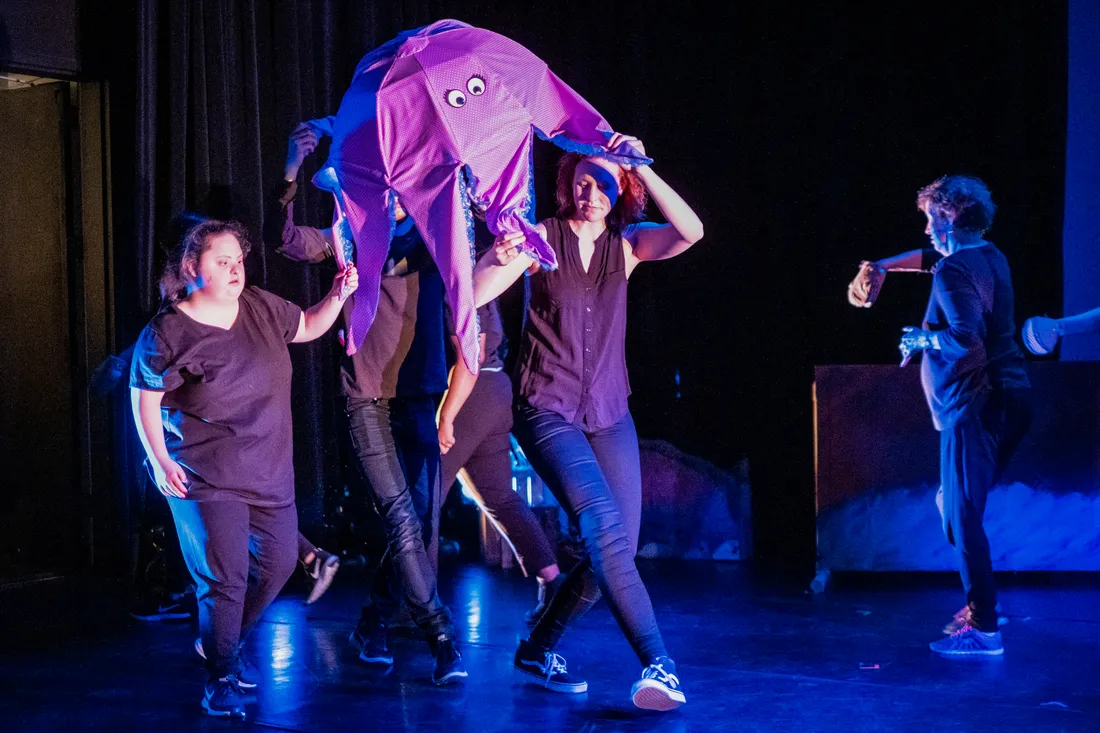
Laura Borgwardt ’10 (center) manipulates an octopus puppet in CO/LAB’s production of Hidden Away: A Pirate Musical. (Photo by Andrew Bisdale)
Making Everyone Feel Welcomed
CO/LAB grew out of a 2011 meeting of the four alumni in Manhattan, where they hatched a plan for an inclusive theater company. “In those days, there were only one or two such companies in New York City,” Leifman continues. “Today, there are about a half dozen of them.”
They came up with “CO/LAB,” an acronym for “Creative Opportunities Without Limits and Boundaries.” The name also is short for “collaboration,” one of the company’s overarching themes. “We believe in matching the right person with the right role,” says Borgwardt, a seasoned actor and CO/LAB teaching artist. “Having a 2:1 participant-to-artist ratio helps everyone feel welcomed and valued.”
Art isn’t a privilege; it’s a basic human right. That’s why CO/LAB is so important.
Sarah Olbrantz ’10
Starting with a pilot class of 13 actors, CO/LAB has grown to include programs and services in all five boroughs. CO/LAB:core is the company’s oldest and biggest program, featuring a semester-long lineup of classes that culminate in multiple public performances. For the actors, selecting different subjects on different days is like perusing the Choose Your Own Adventure book series. “You never know how a class is going to end, but getting there is half the fun,” Leifman says.
Also unique to CO/LAB:core is an emphasis on original creativity—actors come up with their own script ideas, which are fleshed out and workshopped over several months. The result is usually more of a showcase, highlighting individual strengths, than a fully realized ensemble production.
Rounding out CO/LAB’s offerings are CO/LAB:connect, where teaching artists facilitate offsite workshops and long-term residencies, and CO/LAB:leaders, in which actors like Coles learn how to serve as artistic mentors.
In all cases, the emphasis is on authentic expression. “We don’t assume anything about our actors—what they can and cannot do,” says Leifman, noting CO/LAB’s desire to challenge perceived perceptions of disability. “They’re experts in their own experiences.”
Answering the Call
Inclusive theater is a relatively new phenomenon, having evolved out of the Disability Arts Movement of the late 1970s. The College of Visual and Performing Arts (VPA) answered the call in 1991 with the founding of All Star C.A.S.T. Short for “Community Actors and Students’ Theater,” the program is renowned for helping people of all ages with disabilities discover the joy of acting. It also instills in them a sense of agency.
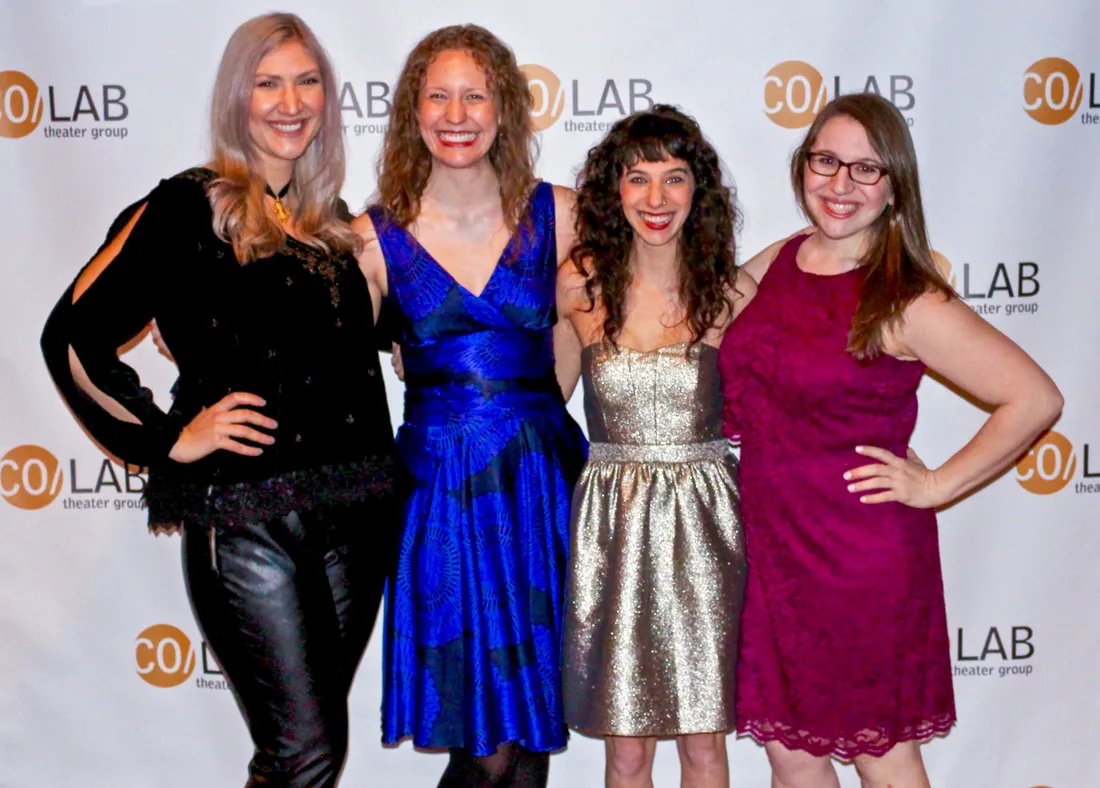
CO/LAB co-founders (from left) Sarah Olbrantz, Laura Borgwardt, Arielle Lever and Becky Leifman, all members of the Class of 2010. (Photo by Liz Furze)
“Historically, people with disabilities have been told that their contributions don’t matter,” says Leifman, who became an All Star C.A.S.T. facilitator her first year at Syracuse. “All Star C.A.S.T. taught me about the value of co-creation—offering a safe, nonjudgmental space for others.” It’s also where she learned theater games and activities that have made CO/LAB successful, like beginning each workshop with a dance party.
It was through VPA’s drama department that Leifman befriended Borgwardt, Lever and Olbrantz—fellow performers with a passion for advocacy. Olbrantz recalls how the four of them vowed to move to New York City after graduation and start something like All Star C.A.S.T. “We wanted to offer something welcoming,” adds the Seattle-based play and drama therapist. “Being on our own in the big city made us realize that we probably needed a space like CO/LAB as much as our actors did.”
Working with the disabled community has taught them volumes about empathy and compassion. “We built our theater practice around saying, ‘Yes, and …,’” explains Lever, a CO/LAB administrator-turned-teaching artist. “That’s why so many actors have stayed with us since the beginning. They know they can make bold artistic choices without fear of judgement and still have lots of fun.”
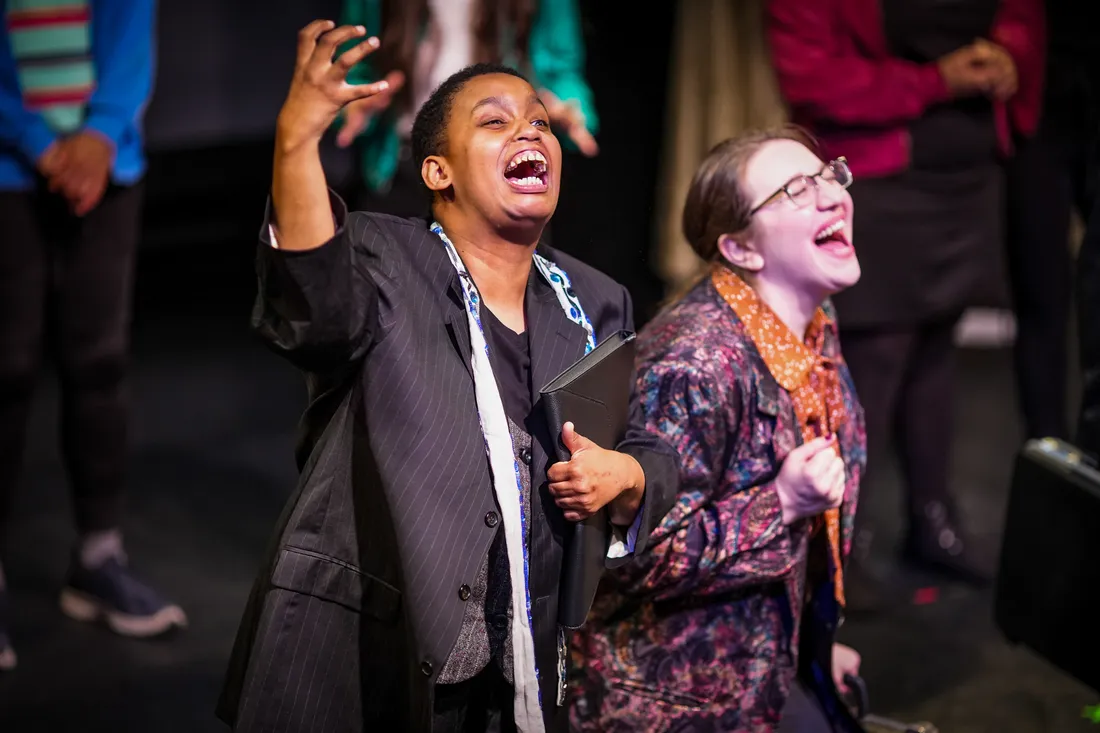
Danielle Coles (left) with Becky Leifman ’10 in An Itty Bitty Musical, co-written by Matte O’Brien ’04 and Matt Vinson. (Photo by Stewart Villilo)
Bringing Something Unique to the Stage—and the World
As CO/LAB enters its second decade (a major feat for almost any arts organization), it’s hard not to move forward without looking back. Each co-founder has brought unique skills to the table, producing something greater than the sum of its parts.
Impressive, considering the original plan was to run a theater program out of a disability agency or a disability education program out of a theater. “Everybody turned us down, so we had no choice but to go out on our own,” Leifman says. “All Star C.A.S.T. prepared us, and we were ready.”
Never mind that it was the wake of the Great Recession—not a good time to ask for start-up money. Nevertheless, the cohort prevailed, securing a grant to mount their first show—the peculiarly titled Mystery of the Flying Ball at the Canary Islands Circus: Part I—in a modest Midtown rental.
Word traveled fast about CO/LAB, which, among other things, provided services to people with disabilities who didn’t have any. Particularly those who had aged out of public education or fallen off the so-called disability services cliff.
We believe in matching the right person with the right role. Having a 2:1 participant-to-artist ratio helps everyone feel welcomed and valued.
Laura Borgwardt ’10, CO/LAB co-founder
Aspiring actors, along with their service providers and family members, couldn’t join fast enough. A community formed. “The most important thing to know about CO/LAB is that you are the most important thing,” says one parent.
Today, CO/LAB supports more than 40 leaders and teaching artists. It also benefits from a board of directors, an associate board and an advocacy committee. Gone are the days of scrappy, impromptu meetings wherever space allowed—a small cafe, a hotel lobby, the rear of a drugstore. “That was when the city was our office,” brags Borgwardt. Today, strategic plans and budget spreadsheets are just as important as lighting cues and stage directions.
Borgwardt, who has been teaching drama since age 14, praises CO/LAB as “representation in action”—from giving participants the chance to perform with Glee’s Ali Stroker (the first actor using a wheelchair to win a Tony) to partnering with disability organizations like Lincoln Center’s Passport to the Arts and New York City’s District 75 schools. Theater benefits people of all abilities, Borgwardt maintains. “It’s a reminder that each of us brings unique experience to the ensemble—and the world.”
Adds Olbrantz: “Art isn’t a privilege; it’s a basic human right. That’s why CO/LAB is so important.”
Photos courtesy of CO/LAB Theater Group.


